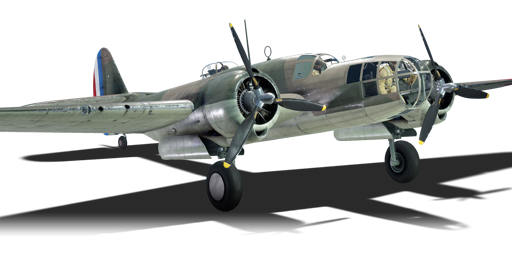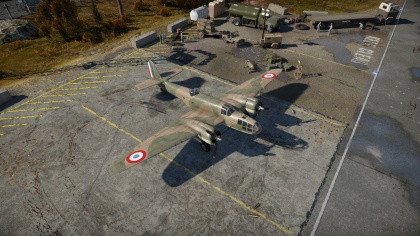Difference between revisions of "Martin 167-A3"
(Added tables, added some data.) |
m (Manual Engine Control Table Updated) |
||
| Line 186: | Line 186: | ||
! Type | ! Type | ||
|- | |- | ||
| − | + | | Not controllable || Controllable<br>Automatic pitch || Controllable || Not controllable || Combined || Controllable || Not controllable | |
| + | |- | ||
|- | |- | ||
|} | |} | ||
Revision as of 14:25, 2 November 2018
Contents
Description
The Martin 167-A3 is a Rank I French frontline bomber with a battle rating of 2.3 (AB/RB/SB). It was introduced in Update 1.77 "Advancing Storm".
General info
Flight Performance
| Characteristics | |||||||
|---|---|---|---|---|---|---|---|
| Stock | |||||||
| Max Speed (km/h at ?,000 m) |
Max altitude (meters) |
Turn time (seconds) |
Rate of climb (meters/second) |
Take-off run (meters) | |||
| AB | RB | AB | RB | AB | RB | ||
| ? | ? | ?,000 | ??.? | ??.? | ??.? | ??.? | ??? |
| Upgraded | |||||||
| Max Speed (km/h at ?,000 m) |
Max altitude (meters) | Turn time (seconds) | Rate of climb (meters/second) |
Take-off run (meters) | |||
| AB | RB | AB | RB | AB | RB | ||
| ? | ? | ?,000 | ??.? | ??.? | ?.? | ?.? | ? |
Details
| Features | ||||
|---|---|---|---|---|
| Combat flap | Take-off flap | Landing flap | Air brakes | Arrestor gear |
| X | X | X | X | X |
| Limits | ||||
|---|---|---|---|---|
| Wing-break speed (km/h) |
Gear limit (km/h) |
Combat flap (km/h) |
Max Static G | |
| + | - | |||
| ??? | ??? | ??? | ~?? | ~? |
| Optimal velocities | |||
|---|---|---|---|
| Ailerons (km/h) |
Rudder (km/h) |
Elevators (km/h) |
Radiator (km/h) |
| < ??? | < ??? | < ??? | > ??? |
| Compressor (RB/SB) | ||
|---|---|---|
| Setting 1 | ||
| Optimal altitude | 100% Engine power | WEP Engine power |
| ?,??? m | ??? hp | ?,??? hp |
Survivability and armour
- No armour plating
- No armour glazing
- Critical components located at front of aircraft (fuel, pilot, engine, controls)
Armaments
Offensive armament
The Martin 167-A3 is armed with:
- 4 x 7.5 mm FN Browining machine guns, wing-mounted (800 rpg = 3200 total)
The four machine guns are arranged in bundles of two mounted in each wing. Each are armed with the same amount of ammunition, which means that all guns will fire with each other until empty.
Suspended armament
The Martin 167-A3 has the following payload options:
- 8 x 50 kg DT2 bombs
- 16 x 50 kg DT2 bombs
Defensive armament
The Martin 167-A3 is defended by:
- 1 x 7.7 mm Vickers K machine gun, dorsal turret (500 rpg = 500 total)
Usage in the battles
High-altitude bomber: For high altitude bombing, gaining altitude is a priority, especially to put distance between you and fighters that rumble around the low-mid altitudes. At higher altitudes, mobile targets will be difficult to bomb as they will scatter when your bombs are released. Up high, it is better to focus on immobile targets such as artillery/AA gun emplacements or bases (if they are on the map). In AB, one way to gain altitude is to:
- Immediately on spawn, drop all bombs, hit WEP and climb.
- As WEP runs out, level the plane and wait for the next WEP cycle. It takes about three WEP cycles to get to a decent altitude.
- Remember, as you are climbing, release bombs as they reload to reduce weight.
- Once you are at a decent altitude, fly towards your targets and prepare to bomb utilizing the bomb sight (V).
- If you start to see fighters working their way up towards you, continue on climbing in between bomb reloading cycles.
- Repeat 4-5 as needed until you get shot down or the game ends.
Mid-Low altitude bomber: At the mid-low altitudes you are a prime target for fighters, being not as manoeuverable and a fairly large profile. Here you may only get one chance to drop your bombs before being shot down, so look for holes in the enemy defense where you can slip by, line up a shot, drop your ordinance and manouever out for another run (or reload at base if playing RB/SB). If pressed and there are enemy all around, turn into heavy-fighter mode after your ordinance has been dropped and start pursuing. The turn and loop time is not the greatest, however this aircraft has a strong rudder and can do a power-on wing-over, quickly changing directions without much loss in energy (and a surprise to some pursuit aircraft who think they have you nailed). At this point, you can also transition to attacker mode.
Attacker (on the deck): While the four wing mounted 7.5 mm FN Browning machine guns may not seem like much, when coupled with the 50 kg bombs, you can rack up some vehicle kills. While strafing the ground, all soft targets are available as the vehicles will not have much time to get out of the way of your ordinance. In AB it is best to use your 3rd person view to use the bombing indicator as you will need to fly the aircraft and bomb at the same time (vs. using (V) and solely utilizing the bomb sight while the AI keeps the aircraft level). In between bombing reloads you can strafe with your 4 x 7.5 mm machine guns to eliminate artillery/AA gun emplacements and armoured vehicles. While on the deck, you will typically encounter enemy aircraft and can divert to go after them if given the chance or perform evasive maneuvers while your gunner fires away (you get credit for hits, so let him fire away!).
Manual Engine Control
| MEC elements | ||||||
|---|---|---|---|---|---|---|
| Mixer | Pitch | Radiator | Supercharger | Turbocharger | ||
| Oil | Water | Type | ||||
| Not controllable | Controllable Automatic pitch |
Controllable | Not controllable | Combined | Controllable | Not controllable |
Modules
| Tier | Flight performance | Survivability | Weaponry |
|---|---|---|---|
| IA | |||
| II | |||
| III | |||
| IV |
Pros and cons
Pros:
- Decently manoeuverable for a bomber.
- Short take off distance (which is great for maps with short runways).
- Fast.
- Tracer belts for the forward-firing MGs are flamethrowers.
- Good visibility from the cockpit.
- Decent rate of climb at full load (best when ordinance is released).
- Strong rudder control - aids in sharper manoeuvers.
Cons:
- No armour protection whatsoever.
- Weak defensive firepower.
- Very light stock payload.
- Rear gunner field of vision and fire is small.
- Rear gun is on a pintle mount, and cannot traverse forward.
- Extremely prone to fuel fires.
- (RB/SB) Flaps tear off quickly and at moderate speed (easily red-lines in a dive).
History
Describe the history of the creation and combat usage of the aircraft in more detail than in the introduction. If the historical reference turns out to be too big, take it to a separate article, taking a link to an article about the vehicle and adding a block "/ historical reference" (example: https://wiki.warthunder.com/Name-vehicles/historical reference) and add a link to it here using the main template. Be sure to include links to sources at the end of the article.
Media
An excellent addition to the article will be video guides, as well as screenshots from the game and photos.
Read also
Links to the articles on the War Thunder Wiki that you think will be useful for the reader, for example,
- reference to the series of the aircraft;
- links to approximate analogues of other nations and research trees.
Sources
Paste links to sources and external resources, such as:
- topic on the official game forum;
- page on aircraft encyclopedia;
- other literature.





